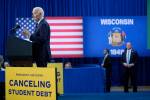EDITORIAL: Federal judge not a fan of Biden’s pen, phone
President Joe Biden beat the expectation game on Tuesday, but Democrats still lost control of the House. It’s worth noting that both George W. Bush and Bill Clinton presided over congressional gains during midterm elections.
Mr. Biden insisted after the balloting that he’ll do “nothing” differently during the next two years. That’s not very realistic given that his party no longer has a majority in both houses of Congress. He’ll also have to deal with a judiciary likely to be increasingly skeptical of presidential overreach.
On Thursday, one such judge shot down a signature White House achievement, ruling that the president didn’t have the constitutional authority to unilaterally forgive billions in student loan debt. “In this country,” wrote Judge Mark Pittman of the U.S. District Court for the Northern District of Texas, “we are not ruled by an all-powerful executive with a pen and a phone.”
It was the administration’s second setback on the issue in a month. A federal appeals court had previously stayed Mr. Biden’s directive — which would have canceled up to $10,000 in debt for traditional borrowers, up to $20,000 for Pell Grant recipients — until it could consider the case.
The White House justified the debt amnesty by claiming the COVID crisis allowed the president to act under the emergency provisions in the Higher Education Relief Opportunities for Students Act of 2003. That legislation was intended to provide the executive branch with leeway to waive student debt for military members returning from the Middle East.
Proponents of debt cancellation argue that many of those challenging the president’s executive order lack the proper “legal standing” to do so. But Judge Pittman ruled the proposal triggered the “major-questions doctrine,” a judicial principle that demands Congress explicitly authorize consequential policy actions undertaken by the executive branch. Wiping out billions in student loan obligations “is an agency action of vast economic and political significance,” the judge held.
From the beginning, Mr. Biden’s plan was a cynical political ploy intended to generate support from young voters. There were obvious fairness issues — the amnesty would primarily benefit the well-off and be a slap in the face to those who didn’t go to college, paid their own way or met their financial obligations. But of equal importance, the proposal did nothing to address the underlying problems with the government’s student loan operations, setting taxpayers up for a repeat.
“The constitutional issue is straightforward: The Constitution gives the power of the purse to Congress,” wrote Neal McCluskey of the Cato Institute, “but in declaring that it would forgive up to $20,000 in loans for households making below $250,000 a year, the Biden administration essentially created about $400 billion in new spending.”
The Justice Department immediately appealed Judge Pittman’s ruling. But if the Biden administration is truly serious about attacking the $1.7 trillion student loan crisis, it should now seize the opportunity to work with a divided Congress to craft compromises that help students pursue their higher education dreams without handing them a blank taxpayer check and encouraging colleges and universities to jack up tuition costs.




























